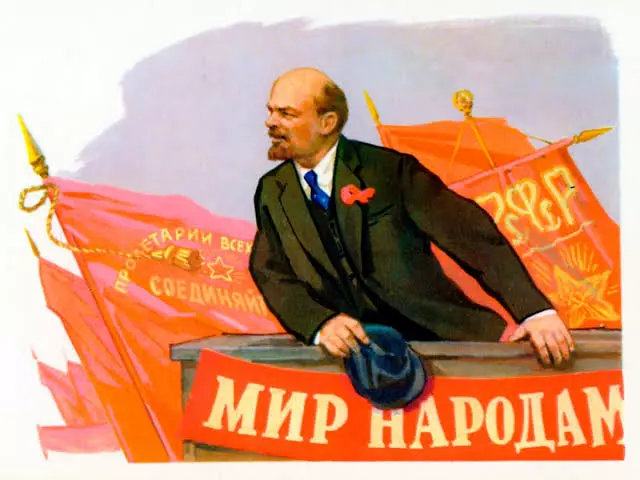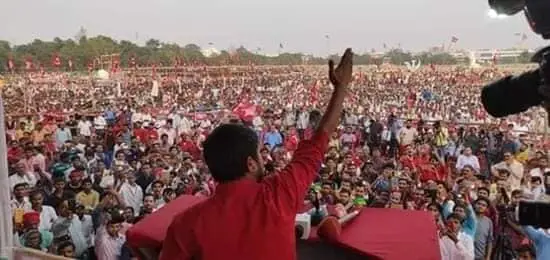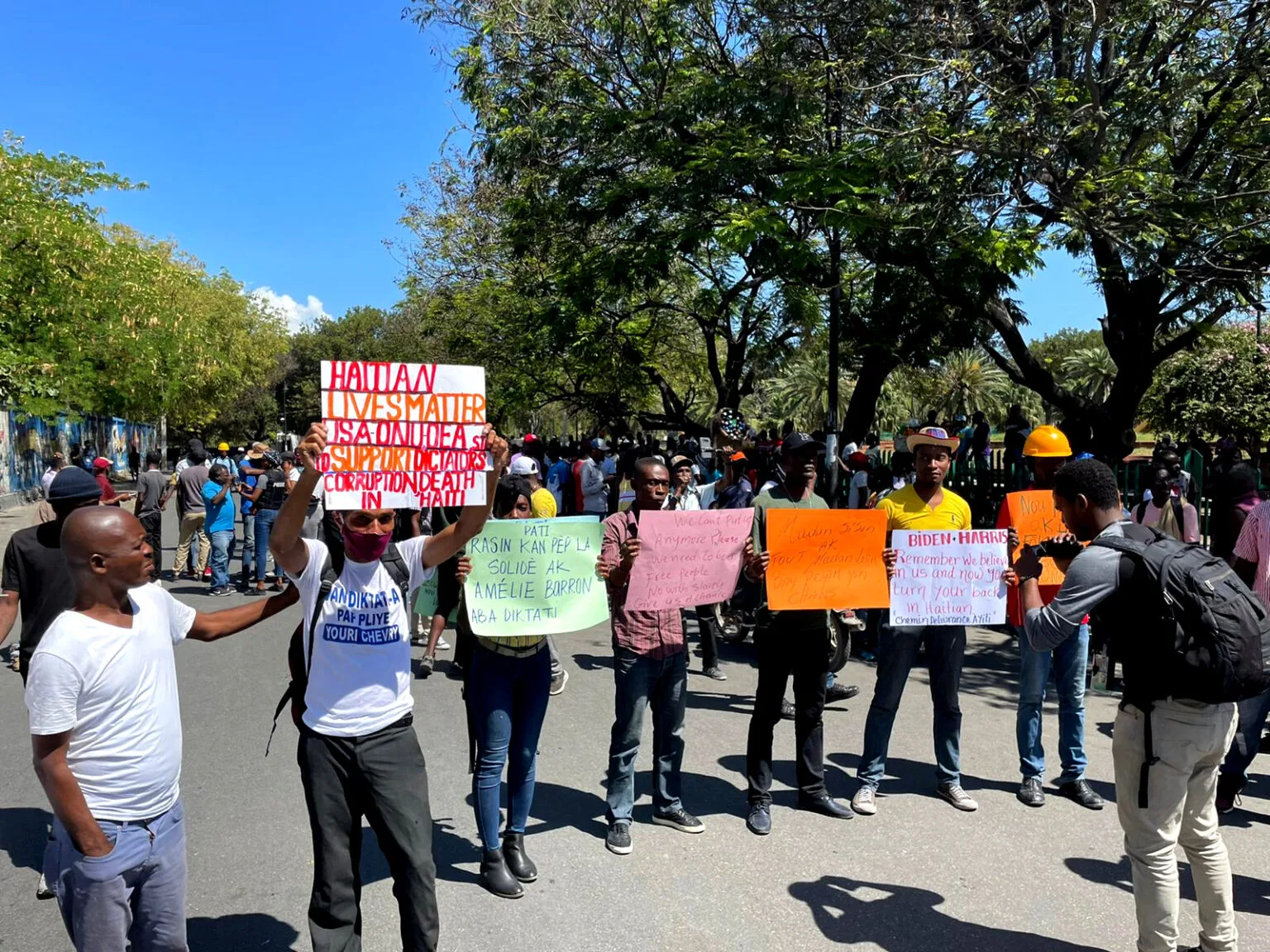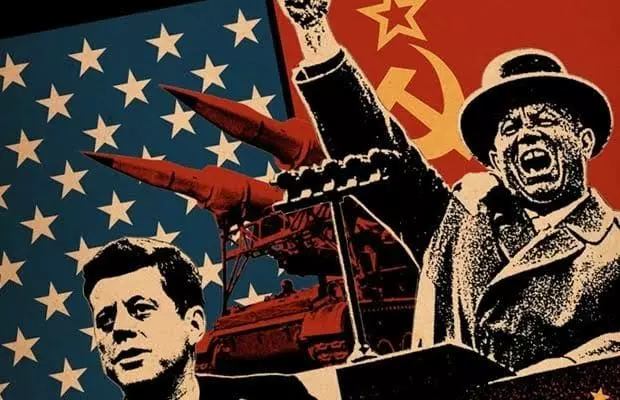The Communist Party has always united with the workers in their fight for immediate demands under capitalism such as better wages, better working conditions, and safer work environments. This is what generally constitutes the policy of the United Front. Its aim is to unite the working class against capitalist attacks, and was the position of the Comintern up until its 7th congress.
The situation preceding the general crisis of world capitalism before World War II called for this basically correct policy as well as that of thoroughly fighting against forces on the left that ultimately serve to weaken and break the workers resistance against capitalist aggression. With the practical effect being the victory of fascism if the workers are beaten. These forces are what we call social-fascists.
However, once the victory of fascism was achieved in Germany, Italy, and Japan, the conditions ostensibly called for a more advanced policy. The presence of fascism had a deleterious effect on the entire world and threatened to pull the whole of humanity down with it. No longer could the struggle against social-fascists be carried on in the same way.
The international situation called for the policy of a People’s Front. This differs from the United Front as its basis of unity extends beyond the working class and seeks to unite an entire people, the progressive elements which for one reason or another stand against fascism and against the capitalists offloading the crisis onto the workers.
As well, the stronghold of world socialism, the USSR, was under threat of invasion by the German fascist forces. The defense of the international position of communism required a tacit alliance on the lines of anti-fascism between the socialist camp and the capitalist camp which had not fallen into fascism. Dimitrov, secretary of the Comintern, explains the reasoning for this at the 7th congress of the Comintern in 1938:
“We Communists employ methods of struggle which differ from those of the other parties; but, while using our own methods in combating fascism, we Communists will also support the methods of struggle used by other parties, however inadequate they may seem, if these methods are really directed against fascism.
We are ready to do all this because, in countries of bo-urgeois democracy, we want to block the way of reaction and the offensive of capital and fascism, pr-event the abolition of bou-rgeois-democratic liberties, forestall fascism’s terrorist vengeance upon the proletariat and the revolutionary section of the peasantry and intel-lectuals, and save the young generation from physical and spiritual degeneracy.
We are ready to do all this because in the fascist countries we want to prepare and hasten the overthrow of fascist dictatorship.
We are ready to do all this because we want to save the world from fascist barbarity and the horrors of imperialist war.
Ours is a Congress of struggle for the maintenance of peace, against the threat of imperialist war”
The struggle of the French people, led by the Communist Party of France on the lines of a People’s Front against the rising tide of fascism before WWII proved effective at preventing the rise of fascism in France before Hitler invaded. The resolve of the French people to resist fascism was a boon to the world anti-fascist movement. Even though with the defeat of France during WWII, their people carried on the anti-fascist fight which was best represented by the heroic resolve of the French Partisans.
The Communist Party USA, seeked the same success as the tendrils of fascism crept over our own country in the wake of the Great Depression. The threat of fascism in the US was real and presented a revolutionary situation as Stalin outlined at the ECCI in 1929. Twice US finance capital seeked to overthrow the bourgeois-republic, first with the American Liberty League, and a few years later with the American First Committee.
As Dimitrov and Stalin outlined at the 7th congress, the fascists rummage through history and uphold or revise it in order to validate, and achieve support for their anti-democratic and anti-people aims. CPUSA general secretary Browder took on the task of combating this by trying to show the progressive side of American history which the capitalists all too often obscure and suppress.
Simultaneously, the cooperation between the Soviet Union and the USA in anti-fascist efforts produced great expectations about the possibility of a lasting alliance. In fact, the feeling was so pronounced that many in the party leadership came to see the US bourgeoisie as basically progressive, beyond the context of the Anti-Fascist People’s Front.
During the war, the party even went as far as to restrict its agitation among the workers in order to further alliances with center-left forces. This meant ceasing criticism against social democrats and the like, as well as ending political education among the workers to further relations with bourgeois organizations or even calling attention to the anti-worker policies of the big capitalists.
In order to achieve the unity required for the People’s Front, the concept of National Unity was needed. This concept was essentially an all-class alliance against fascism. As Browder explained in Victory - and After, it had the goal of “uniting the entire nation, including the biggest capitalists, for a complete and all-out drive for victory.”
The defeat of fascism, as argued by Dimitrov and Stalin, necessitated the party to uphold the progressive elements of our national history, to open the scope of our agitation to appeal to all elements of society and lead the American people against fascism. This meant that the party would appeal to cultivated bourgeois sentiments among the people in regards to the “Founding Fathers” and the first American Revolution. This was showcased by “Jeffersonian Democracy” being enshrined in the CPUSA constitution and argued to be the American path towards communism.
By 1940 however, the CPUSA had left the Comintern in order to further its National Unity policy. This is due to the capitalist Allies accusing the comintern of fomenting the “Bolshevization'' of the US and others. For the Party’s policy to succeed, it required it to make every effort to prove its commitment to the American people and their national interests. It was feared that not having left the Comintern would have hurt the campaign of National Unity. In fact, Browder later argued in 1944 after the Teheran conference that it was essential for the Communist Party to not “push” the progressive elements of US capital towards reaction.
Because of the policy of National Unity, and bringing into the fold both the workers and big capitalists against fascism, it was said to have required on the part of the big capitalists a progressive interest to do so. Browder suggested in his 1944 work Teheran - Our Path in War and Peace that this National Unity was possible owing in part to the immaturity of US capitalism and the classes therein not fully understanding their own class interests or positions. His ultimate point being that US capitalism constituted a peculiarity of world capitalism, ie., not bound to the same laws of capitalist political-economy which was true of all other capitalist countries.
This progressive interest was in the petty-bourgeois concern for “free-enterprise.” On this line of appealing to US capital’s concern for “free-enterprise,” rested the Anti-Fascist People’s Front, ie, the alliance of the CPUSA and the US bourgeoisie to redivide the world market. And this “peculiarity” of the immaturity of US capitalism was said to have stemmed from the same conditions of the US that gave rise to “Jeffersonian Democracy.” This referred to a particular period of the US that saw Jefferson elected on a popular campaign against large landowners and bankers who retarded the development of industry.
Jefferson’s campaign consisted of both working class elements and that of the industrial bourgeoisie that was prevented from developing under the conditions of the monopoly-landowners, otherwise known as the planter class, or land speculators. This unity of the American workers and elements of the bourgeoisie in opposition against certain monopoly forms (particularly land and slave owners) formed the basis of the “peculiarity” of US capitalism which set it apart from world capitalism. The American values which comprise this unity such as rights of free speech, assembly, worship, trial by jury, expansion of the franchise, and the like all aided Jefferson’s ability to garner the support of the budding bourgeoisie.
As early as 1938, this perspective on Jefferson and US capitalism became the party line: "A full and complete application of Jefferson's principles, the consistent application of democratic ideas to the conditions of today, will lead naturally and inevitably to the full program of the Communist Party, to the socialist reorganization of the United States, to the common ownership and operation of our economy for the benefit of all." Though, four years prior in 1934 the slogan of “Communism Is Twentieth Century Americanism” had already been popularized by the party leadership. And here the concept of “Americanism” refers to the democratic ideals of Jeffersonian democracy, a wholly bourgeois concept.
With this foundation of a progressive essence to US capitalism, the context of the unity between the capitalist and socialist camps against fascism took on a different perspective than initially thought of as that of a tacit strategic alliance. Not only the possibility for a progressive interest among the capitalists became considered by party leadership, but its actuality. And if the US represents a progressive form of capitalism capable of peacefully, inevitably, leading to communism, then it should be the work of communists to aid the development of US capitalism.
This campaign of unity with the national interests of the US bourgeoisie in its progressive drive against fascism, required, too, that in the spirit of proving communist commitment to the US that the party withdraw from the Comintern in 1940. This is because the capitalist “allies” wasted no effort in accusing all the communist parties and the Comintern itself of acting in a concerted effort to “Bolshevize” them. It is a long standing accusation of the party as receiving orders from Moscow. Stalin explained the dissolution to Reuters shortly after its finalization in 1943:
“The dissolution of the Communist International is proper because:
(a) It exposes the lie of the Hitlerites to the effect that “Moscow” allegedly intends to intervene in the life of other nations and to “Bolshevize” them. From now on an end is put to this lie.
(b) It exposes the calumny of the adversaries of Communism within the Labour movement to the effect that Communist Parties in various countries are allegedly acting not in the interests of their people but on orders from outside. From now on an end is also put to this calumny.
(c) It facilitates the work of patriots of all countries for uniting the progressive forces of their respective countries, regardless of party or religious faith, into a single camp of national liberation—for unfolding the struggle against fascism.
(d) It facilitates the work of patriots of all countries for uniting all freedom-loving peoples into a single international camp for the fight against the menace of world domination by Hitlerism, thus clearing the way for the future organization of a companionship of nations based upon their equality.”
Furthermore, the conditions of World War II for the Soviet Union meant intense battles mainly being fought on the eastern front. The allies refused to attack from the west until after the comintern was dissolved.
In the international context of the alliance between the capitalist and socialist camps, this international camp against fascism, led many to believe a new world was on the horizon. The prospect of both camps working together for the benefit of all was a seemingly tangible possibility. Many assurances from both sides were made on the post-war order of the world.
In fact, peaceful coexistence was not a new idea. Lenin also considered it not only possible, but a necessity for building socialism while encircled by capitalism. This is because a global revolution at the same time was not possible. So naturally, socialism would crop up in one country or another while existing side by side with capitalist states. Peace as a matter of foreign policy is then not negotiable, it's a requirement of survival for the proletarian state until socialism has sufficiently encircled capitalism.
Yet, in the conditions of the Anti-Fascist People’s Front, the threat of fascist terror proved to be a far more pressing concern, and rendered the antagonism between the two systems secondary while fascism existed. In 1947, Stalin explained that “[t]he difference between them [capitalism and socialism] is not important so far as co-operation is concerned. The systems in Germany and the United States are the same but war broke out between them. The U.S. and U.S.S.R. systems are different but we didn’t wage war against each other and the U.S.S.R. does not propose to. If during the war they could co-operate, why can’t they today in peace, given the wish to co-operate?“
Peaceful coexistence as a practical possibility was thus built upon the concessions of the international communist movement to unite both camps against fascism. And owing to the progressive aspirations of the people from both camps toward a post-war world, no sacrifice was too sacred to further the Anti-Fascist People’s Front, up to and including the dissolution of the Communist International. Thus, the international communist line was set on the facilitation of national interests to build “national unity”, rather than an international centre for proletarian revolution.

However the Communist Party of Greece (KKE) thoroughly repudiates the long believed purpose of the dissolution of the comintern. The characterization of the war by the comintern to be initially that of an imperialist war to redivide the world market was abruptly changed to being anti-fascist once Germany invaded the USSR. The KKE argues that the real character of the war as being an imperialist war was inescapable and unavoidably part and parcel of the underlying conditions of the war but underestimated in the line of the Anti-Fascist People’s Front. The KKE explains in its report on the Comintern by the Section of the International Relations of the Central Committee of the KKE:
This position underestimated the fact that the character of the war is determined by which class wages the war and for what purpose, whether it is originally and at that particular moment on the defense or on the attack. The struggle against fascism and the liberation from foreign occupation, for democratic rights and freedoms, was detached from the struggle against capital.
The contradictions in the CI’s (Communist International) line on the character of World War II were also influenced by the aspirations of the USSR’s foreign policy and by its attempt to defend itself from an imperialist war. However, in any case, the needs of the foreign policy of one socialist state cannot supplant the necessity of a revolutionary strategy for every capitalist country. The ultimate security of a socialist state is determined by the worldwide victory of socialism or its prevalence in a powerful group of countries and hence, the struggle for revolution in each country.
Further, the change in policy of the communist parties to this new reality meant doing away with previous methods of work as was done before the rise of fascism. To prevent a collapse of the international camp, and its tenuous alliance, the role of the communist party was redirected away from an exposure of the oppressive policies of the bourgeoisie. The party saw such agitation as a threat which could culminate in driving progressive capital towards reaction.
Through this context of national unity, progressive capitalism, and peaceful coexistence, the dissolution of the Communist Party USA took place and its re-formation into the Communist Political Association (C.P.A.) in 1944. This was an organization not for the revolutionary overthrow of the bourgeoisie, but for “Marxist edification” of the American people who by means of the existing bourgeois political structure of the country would realize socialism peacefully in alliance with progressive monopoly capital. The party of a new type, Leninism itself, finally being rejected.
It is quite easy and convenient to attribute all of the incorrect policies of the party during the war period to Browder. He was of course the general secretary of the party in the period. The theoretical leader of the party. However, this would fall into the easiest traps of analyzing this period. The Popular Front, National Unity, Progressive Capital, and Peaceful Coexistence were not solely Browder’s ideas. These all came from the international movement and its leaders. As well, almost every communist party in the advanced capitalist countries fell into similar mistakes.

Ultimately, we cannot ignore the reason why the Communist International was dissolved to further the national unity campaigns of the parties in the advanced capitalist countries in order to gather bourgeois support against the Axis. Neither can we ignore the extent to which peaceful coexistence was believed to be not only possible, but probable in a post-war world. That hostile attitudes and imperialist interests would dissipate in the absence of the unifying threat of fascism was not seriously considered.
What many call Browderism was in reality then a global right-opportunist phenomena which stemmed from imperialism and its effect on the policies of the international communist movement during the war. Browderism is only how it manifested under the conditions of the US. This also explains why all the advanced capitalist countries fell victim to their own national variants of Browderism. Nevertheless, in essence, it can be said to have arisen in part out of an upward swing in conditions, a lull in the growth of the movement and from political immaturity. As well as the social composition of the parties in the advanced capitalist countries. Plainly, from opportunism.
By virtue of our analysis coming some 80 years after the policies of the Popular Front, some truths are self-evident. Such being that many parties in the absence of the Communist International fell into social-democracy, the capitalist camp vehemently attacked and subverted the People’s Democracies of Europe, and finally, had a hand in the dissolution of the USSR in 1991. The long desired peaceful coexistence, its technical possibility, and historical necessity only resulting in the loss of the international position of the communist movement.
Perhaps the alliance between the capitalist and socialist camps was only possible through the shared interest in destroying the rise of fascism, and ultimately in furthering imperialist interests. Stalin further qualified such an alliance as being possible only if the underpinning impetus to its continuation in the context of shared interests overcoming the fundamental contradiction between states remained intact. Alliances between capitalists states are predicated on the build-up of forces for the re-division of markets, this is indisputable, alliances between imperialist bourgeois-democracies and socialism are, as evidenced by the practical result of the second world war, predicated on the existence of a threat to both bourgeois-democracies and socialism.
The “desire,” so to speak, which conditions the unity between the two camps against fascism stems from the very nature of fascism. Without this threat, the domination of imperialism becomes the overriding interest of the capitalist camp if it is not all along.
The economic logic of imperialism necessitates war, it requires the penetration of new markets. Peace between the socialist and capitalist camps can then only ever be tenuous at best. The capitalists will never stop looking for weak points in the proletarian state to subjugate it to the interests of capital. The only way to maintain peace between the camps then is through trials of strength, otherwise the capitalists will attack with force and destroy the socialist state. Lenin was very clear that peaceful coexistence was limited and conditional:
“the very thought of peacefully subordinating the capitalists to the will of the majority of the exploited, of the peaceful, reformist transition to Socialism is not only extreme philistine stupidity, but also downright deception of the workers, the embellishment of capitalist wage slavery, concealment of the truth.”
In fact, the entire purpose of the Communist International was to serve as an organizing body of the world proletariat to combat the encirclement of the young Soviet Republic, the stronghold of socialism.
In the final analysis, the Axis was defeated, but at a severe cost to the international communist movement which still struggles against fascist reaction today. The factors which contributed to the degradation of the western communist parties are situated in a deeper analysis of the conditions of capitalism retarding the ideological development of the workers and subsequently the communist parties therein.
Reflecting on the collapse of the Second International in 1972, Gus Hall remarked,
“The unity between parties was first diluted to a formal unity. But very quickly even the formal ties became obstacles to carrying out opportunist policies. World and class ties between parties became an embarrassment. Each party stated its internationalism would be expressed through effective work, each within each of the national entities.
The leaders of these socialist parties very quickly made “new” discoveries. They decided Marx was wrong. There were no laws of capitalist development that applied universally. There were no worldwide concepts of the class struggle. In each country they discovered “fundamental” national peculiarities that overshadowed international similarities. The working-class interests were watered down to where they did not appear in contradiction with the interests of the ruling class.
The class struggle became purely a “people’s struggle.” Class concepts became national concepts. No party openly condemned internationalism, they just put it on the shelf for “the duration.”
Many of the parties became large mass parties. This was good. But what was not good, was that they became broad popular parties by going along with popular concepts of nationalism and classlessness. They became mass parties by giving up their advanced working-class positions. Their growth was fed by opportunism”
A very apropos analysis of the Second International that has an all-too coincidental similarity to the objective consequences of the 7th Congress of the Comintern line. Opportunism is at the heart of its self-dissolution
* * *
Some Implications and Consequences
If the Popular Front line of the 7th Congress of the Comintern is examined to its end in 1943 it is unquestionable that its primary thesis forms the foundation for several party leaders later on. Let us outline this connection.
As stated previously, it was fully argued under the 7th congress line that the previous periods of the Comintern were a mistake, and were ultra-leftist. The development and popularity of fascism had come out of the "failure" of the communist movement to have adequately embedded itself in the large petty-bourgeois, and nationalist populations. The new line was to correct this mistake by shifting the movement away from “left-sectarian” methods.
In effect, a move away from combating the bourgeoisie ideologically to form the popular front through concessions to it was the systematic dismantlement of proletarian internationalism. "Peaceful Coexistance" as a matter of foreign policy thereafter for the communist movement became perverted to mean outright submission to the capitalists who were now "progressive."
The “broad masses” as defined in the line of 7th Congress of the Comintern were not compelled out of necessity to unite with the communists here as much as was the case in war torn Europe. While all western communist parties eventually devolved into social democracy over several decades, the US party did so not two years after the 7th Congress. No one can deny the fascist threat which loomed and looms in the US, yet the US party was destroyed easily by opportunism.
Again, we cannot stress enough that Browder is merely applying the line of 7th Congress of the Comintern to its logical end. All understandings of Browderism while correct superficially are hollow when examined at a deeper level. Browder was many things, but in the final analysis their failure is primarily to be found in their uncritical approach to the line of 7th Congress of the Comintern. We must also mention that while Foster was correct in recognizing the folly of what came under Browders leadership, they failed to see its real connection to the 7th Congress of the Comintern.






